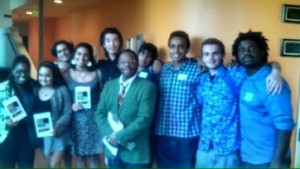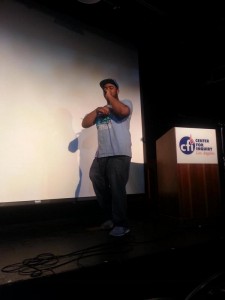
By Sikivu Hutchinson
It was fitting that our recent Moving Social Justice conference in Los Angeles coincided with the Week of Resistance in Ferguson and a Week of Action against school push-out of black and brown youth. In the midst of massive mobilizations around state violence and police terrorism much ink has been spilled over whether or not social justice “conforms” to atheist orthodoxy. The majority of the naysayers have been white dudebros (and a few status quo POCs) shrieking from their perches of privilege about the corruption of atheism by people of color and white allies who give a fuck about the deepening socioeconomic, racial and gender divide in the imperialist U.S. With the GOP potentially poised to take over the Senate and further cement its far right neoliberal anti-human rights agenda for generations to come (with the help of corporate Dems) the political stakes for communities of color couldn’t be higher. Given this climate, the tantrums of first world atheist “purists” are not surprising. When black people talk about the connection between racist prison pipelining and Jim Crow in STEM education of course white atheists want to deflect with how all black folk need is a trip to Darwin Day. For the first time atheist and humanist activists of color are getting organized around an agenda that isn’t all about religion bashing and caricaturing black and Latino believers. This new brand of activist refuses to let the dudebros and POC apologists do their colorblind shuck and jive in the name of some fake atheist solidarity.
That said, Moving Social Justice was a beautiful thing. It was a multiethnic, multi-regional, intergenerational gathering of atheists and religious allies of color who live, work in and/or identify with “the hood” and POC legacies of resistance struggle. For the first time ever racial justice—without apology or accommodation to white people’s let’s-ghettoize-this-into-a-diversity-panel reflex—was the focal point of an atheist-humanist conference.
Sponsored by the People of Color Beyond Faith network, Black Skeptics Group, African Americans for Humanism, CFI and the Secular Student Alliance, the conference spotlighted the intersection of secular humanism, social justice activism and interfaith coalition building. The event was emceed by hip hop artist and Chocolate City Skeptics member MC Brooks. It kicked off with a panel on “Confronting Homophobia and Transphobia in the Black Church” moderated by Teka-Lark Fleming of the Morningside Park Chronicle, the discussion featured Raina Rhoades of Chocolate City Skeptics, Jenn Taylor of Black Atheists of Philadelphia and Reverend Meredith Moises. The panelist critiqued the culture of religious abuse, black male heterosexism, corruption and the “quelling of unrest” in Ferguson by some black churches. During the “LGBTQ Atheists of Color and Social Justice” panel, Reverend Meredith Moise, a practicing Buddhist and spiritual humanist, captured the sentiment of the event when she said “I don’t live in the (white) gay ghettoes I live in the hood and I roll with ya’ll.” Skillfully moderated by Black Freethinkers founder Kimberly Veal, the panel debunked mainstream myths and stereotypes about interracial queer solidarity in an age of rigid segregation and police state violence. Veal informed the audience that recent CDC grants for HIV/AIDS prevention shafted black organizations. Panelists Debbie Goddard and A.J. Johnson drew comparisons between white atheists’ fixation on their “underdog” status and that of white gay men. All four women slammed the hypocrisy of mainstream gay and lesbian emphasis on marriage equality while queer and trans people of color deal with epidemic rates of HIV/AIDS contraction, homelessness, joblessness and anti-trans violence (trans people of color have the highest rates of violent assault among trans communities).
Queer white youth aren’t disproportionately bounced out of school or sent to prison for minor infractions. Yet these disparities are reflected in the high rates of criminalization of queer, trans and straight youth of color. At the schools I work at the majority of those who are being suspended, arrested and shipped off campus are African American. A few months ago Black Skeptics joined the Dignity in Schools campaign, a national coalition to redress the push-out regime in public schools. During the conference, a panel entitled “Busting the School-to-Prison Pipeline” featured activists from three leading L.A.-based juvenile justice and prisoner advocacy organizations. Moderated by Thandisizwe Chimurenga, author of No Doubt: The Murder(s) of Oscar Grant, the panel highlighted the destructive impact of mass incarceration on black and Latino communities nationwide. Tanisha Denard from the Youth Justice Coalition became an activist after being briefly incarcerated for truancy tickets as a student in the Los Angeles Unified School District. The Dignity and Power Coalition’s Mark Anthony discussed how his organization has spearheaded the effort to create a civilian review board with the power to curb rampant inmate abuse in the L.A. County Sheriff’s Department.
Moving out of the insular world of social media and the Internet, the “#beyondsolidarityisforwhitewomen: Feminism(s) of Color” panel highlighted the work of L.A.-based feminist organizers from working class communities of color. All of the women on the panel spoke of the need for intersectional alliances and organizing strategies that recognize the complexities of class, geography, sexuality and gender in one of the most segregated regions in the U.S. Organizer Yolanda Alaniz of the socialist organization Radical Women spoke of the importance of interracial labor activism in a neoliberal economy where public employee unions—many of which are dominated by women of color members—are being gutted and demonized. There was heated discussion about the implications of respectability politics for black women. Moderator Angela Plaid of The Feminist Wire and Nourbese Flint of Black Women for Wellness commented that black women have always been constructed as sexually promiscuous “hos” and that the monomaniacal focus on sex-positivity by some white feminists is irrelevant for feminists of color fighting against

criminalization and economic disenfranchisement in militarized communities. Considering schisms between black and Latino communities over immigration, jobs and language, the panelists also stressed the need to complicate mainstream views of undocumented communities due to the frequent exclusion of African and Asian immigrants from liberal-progressive campaigns for immigrant rights. Freethought Blogs writer Heina Dadabhoy reflected on being socialized into the dominant culture’s divisive model minority myth which is based on the stereotype that Asian Americans bootstrapped their way to success in contrast to “less high-achieving” African Americans and Latinos. Panelists also discussed the media’s portrayal of the Ray Rice case vis-à-vis how sexist misogynist condemnations of Janae Rice intersected with racial stereotypes about black male violence.
In a panel entitled “What’s Race Got to Do With It?” six atheists of color discussed the pros and cons of “inclusivity” versus “accommodation” as well as racism and intersectionality in the atheist movement. Much of the panel unpacked the constant pressure people of color feel to educate “well-meaning” white people about their investment in racism, white privilege and white supremacy. Panelists Georgina Capetillo of Secular Common Ground and Frank Anderson of Black Skeptics Chicago acknowledged the insidiousness of white privilege in the movement but argued that white allies need to be actively engaged. Raina Rhoades, Anthony Pinn of Rice University and Donald Wright of the Houston Black Non-Believers contended that it was incumbent upon white people to educate themselves and stop expecting people of color to play the role of native informant. Moderator Daniel Myatt of Black Skeptics Los Angeles asked panelists to evaluate the impact of secular organizations of color on social justice versus that of black churches. Wright argued that, given the relative newness and scarcity of secular POC social justice organizations, it remains to be seen what impact they will have.

This is an important caveat as the backlash against anti-racist intersectional atheism continues and white atheist organizations reveal themselves to be less interested in POC communities than “minority” dollars and “minority” faces at conferences. Next year’s conference will be held in Houston, Texas.





